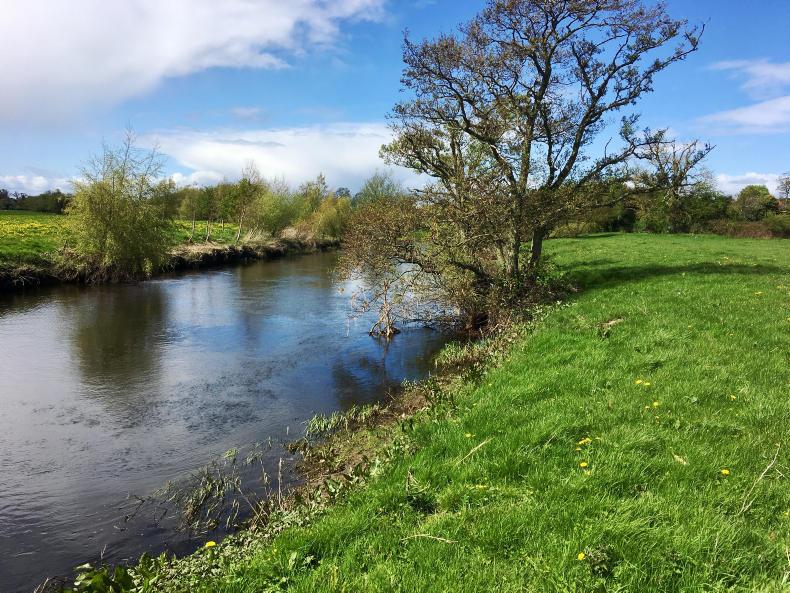Inland Fisheries Ireland has issued an appeal to farmers to remain vigilant during the fertiliser spreading season to avoid water pollution and the loss of nutrients or other chemicals into rivers, lakes and other watercourses.
Its preliminary collation of fish kill data for 2019 indicates that 20 fish kills were recorded nationally, down from the 40 fish kills recorded in 2018.
To prevent waters from being polluted by nitrogen and phosphorus when spreading fertiliser, it is advising farmers to refer to Good Agricultural Practice Regulations guidance which advises:
Spread livestock manure and other organic fertilisers, effluents and soiled water as accurately and as evenly as possible.Do not use an upward-facing splash plate or sludge irrigator on a tanker or umbilical system for spreading organic fertiliser or soiled water.Do not spread organic fertilisers or soiled water from a road or passageway, even if the road or passageway is on your own holding.Do not spread chemical fertilisers, livestock manure, soiled water or other organic fertilisers when land is waterlogged, flooded, is likely to flood, is frozen or when heavy rain is forecast within 48 hours.Do not spread chemical fertilisers, livestock manure, soiled water or other organic fertilisers if the ground has a steep slope and if there is a significant risk of causing pollution.Do not spread chemical fertiliser on land within 1.5m of a surface watercourse.Dr Greg Forde, head of operations at Inland Fisheries Ireland, said: “Livestock manure and other organic fertilisers, effluents and soiled water have the potential to cause devastating pollution in our streams and rivers."
Polluting
“Such effluent is a significant polluting and potentially highly toxic substance, starving fish and other aquatic life of oxygen and resulting in potentially severe fish kills over long distances if it enters a watercourse.
“Impacts can be devastating at any time of year but are magnified in particular when river flows are reduced and dilution capacity is at a minimum. The effect of even a small leak under these conditions can cause huge damage. Inland Fisheries Ireland is grateful to the farming community for their continued consideration and vigilance.
“Good farmyard management and land-spreading practices can help to prevent accidental discharges of polluting substances and protect the local environment. This will have a significant and lasting positive impact on valuable wild fish populations in an area,” he said.
Inland Fisheries Ireland is the state agency responsible for the protection, management and conservation of Ireland's inland fisheries and sea angling resources.
Read more
Revealed: new nitrates derogation rules
Increase agri-environmental and climate payments to farmers – study
Inland Fisheries Ireland has issued an appeal to farmers to remain vigilant during the fertiliser spreading season to avoid water pollution and the loss of nutrients or other chemicals into rivers, lakes and other watercourses.
Its preliminary collation of fish kill data for 2019 indicates that 20 fish kills were recorded nationally, down from the 40 fish kills recorded in 2018.
To prevent waters from being polluted by nitrogen and phosphorus when spreading fertiliser, it is advising farmers to refer to Good Agricultural Practice Regulations guidance which advises:
Spread livestock manure and other organic fertilisers, effluents and soiled water as accurately and as evenly as possible.Do not use an upward-facing splash plate or sludge irrigator on a tanker or umbilical system for spreading organic fertiliser or soiled water.Do not spread organic fertilisers or soiled water from a road or passageway, even if the road or passageway is on your own holding.Do not spread chemical fertilisers, livestock manure, soiled water or other organic fertilisers when land is waterlogged, flooded, is likely to flood, is frozen or when heavy rain is forecast within 48 hours.Do not spread chemical fertilisers, livestock manure, soiled water or other organic fertilisers if the ground has a steep slope and if there is a significant risk of causing pollution.Do not spread chemical fertiliser on land within 1.5m of a surface watercourse.Dr Greg Forde, head of operations at Inland Fisheries Ireland, said: “Livestock manure and other organic fertilisers, effluents and soiled water have the potential to cause devastating pollution in our streams and rivers."
Polluting
“Such effluent is a significant polluting and potentially highly toxic substance, starving fish and other aquatic life of oxygen and resulting in potentially severe fish kills over long distances if it enters a watercourse.
“Impacts can be devastating at any time of year but are magnified in particular when river flows are reduced and dilution capacity is at a minimum. The effect of even a small leak under these conditions can cause huge damage. Inland Fisheries Ireland is grateful to the farming community for their continued consideration and vigilance.
“Good farmyard management and land-spreading practices can help to prevent accidental discharges of polluting substances and protect the local environment. This will have a significant and lasting positive impact on valuable wild fish populations in an area,” he said.
Inland Fisheries Ireland is the state agency responsible for the protection, management and conservation of Ireland's inland fisheries and sea angling resources.
Read more
Revealed: new nitrates derogation rules
Increase agri-environmental and climate payments to farmers – study






 This is a subscriber-only article
This is a subscriber-only article










SHARING OPTIONS: